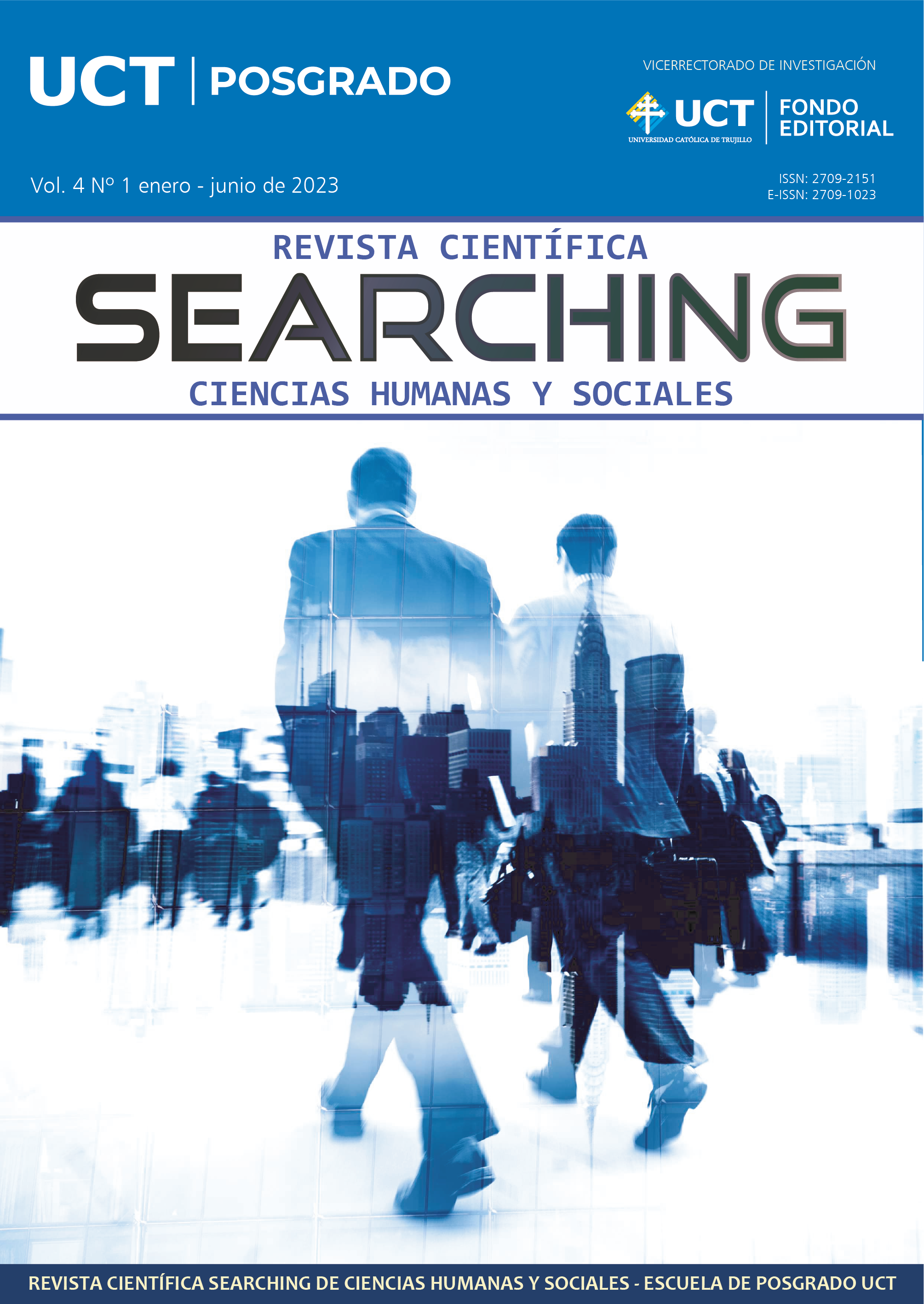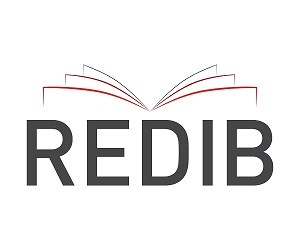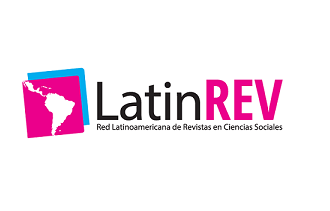Enseñanza remota de emergencia en el proceso de aprendizaje percibida por padres de educación especial
DOI:
https://doi.org/10.46363/searching.v4i1.1%20Palabras clave:
Educación a distancia, educación especial, proceso de aprendizajeResumen
El principal objetivo del presente estudio es determinar en qué medida la enseñanza remota de emergencia (ERE) influye en los procesos de aprendizaje según la percepción de los padres de familia del Centro Educativo Básico Especial Estatal Trujillo (CEBEET). La metodología es de tipo básica, correlacional explicativa, con diseño no experimental, de corte transeccional. Se contó con una población de 141 padres de familia del CEBEET y una muestra de 70, se utilizó la encuesta basada en el cuestionario. Los principales resultados indican que la enseñanza remota de emergencia se relaciona con alta significancia con los procesos de aprendizaje, con un coeficiente de correlación de Rho Spearman de r=0.719** y significancia p<0.01. De igual manera, se determinó la influencia de la enseñanza remota de emergencia en el proceso de aprendizaje y sus dimensiones r2 = 50.0%, r2 = 42.2%, r2 = 36.8%. Se concluye que existe un impacto de la enseñanza remota de emergencia en el proceso de aprendizaje de los escolares de educación básica especial desde la perspectiva de los padres, debido a que pudieron llevar el proceso educativo en confinamiento con limitaciones de herramientas tecnológicas, siendo el soporte familiar necesario en el proceso de aprendizaje en casa.
Citas
Aguliera, E., & Nightengale-Lee, B. (2020). Emergency remote teaching across urban and rural contexts: perspectives on educational equity. Information and Learning Science, 121(5–6), 461–468. https://doi.org/10.1108/ILS-04-2020-0100
Almalki, S., Alqabbani, A., & Alnahdi, G. (2021). Challenges to parental involvement in transition planning for children with intellectual disabilities: The perspective of special education teachers in Saudi Arabia. Research in Developmental Disabilities, 111. https://doi.org/10.1016/j.ridd.2021.103872
Aloizou, V., Chasiotou, T., Retalis, S., & Daviotis, T. (2021). Remote learning for children with Special Education Needs in the era of COVID-19: Beyond tele-conferencing. Educational Media International, 1–21. https://doi.org/10.1080/09523987.2021.1930477
Bonilla, G. R., Cueto, S., & Felipe, C. (2021). La educación de niños y niñas con discapacidad en el Perú durante la pandemia del COVID-19. In Grupo de Análisis para el Desarrollo (GRADE). http://repositorio.grade.org.pe/handle/20.500.12820/669
Canning, N., & Robinson, B. (2021). Blurring boundaries: the invasion of home as a safe space for families and children with SEND during COVID-19 lockdown in England. European Journal of Special Needs Education, 36(1), 65–79. https://doi.org/10.1080/08856257.2021.1872846
Couper-kenney, F., & Riddell, S. (2021). The impact of COVID-19 on children with additional support needs and disabilities in Scotland needs and disabilities in Scotland. European Journal of Special Needs Education, 36(1), 20–34. https://doi.org/10.1080/08856257.2021.1872844
De Souza, F., & Dainez, D. (2020). Educação Especial e Inclusiva em tempos de pandemia: o lugar de escola e as condições do Ensino remoto emergencial. Práxis Educativa, 15, 1–15. https://doi.org/10.5212/PraxEduc.v.15.16303.093
Dong, C., Cao, S., & Li, H. (2020). Young children’s online learning during COVID-19 pandemic: Chinese parents’ beliefs and attitudes. Children and Youth Services Review, 118. https://doi.org/10.1016/j.childyouth.2020.105440
Ewing, L. A., & Cooper, H. B. (2021). Technology-enabled remote learning during Covid-19: perspectives of Australian teachers, students and parents. Technology, Pedagogy and Education, 30(1), 41–57. https://doi.org/10.1080/1475939X.2020.1868562
Gouseti, A. (2021). ‘We’d never had to set up a virtual school before’: Opportunities and challenges for primary and secondary teachers during emergency remote education. Review of Education, 9(3), 1–30. https://doi.org/10.1002/rev3.3305
Green, J. K., Burrow, M. S., & Carvalho, L. (2020). Designing for Transition: Supporting Teachers and Students Cope with Emergency Remote Education. Postdigital Science and Education, 2(3), 906–922. https://doi.org/10.1007/s42438-020-00185-6
Hill, C., Keville, S., & Ludlow, A. K. (2021). Inclusivity for children with autism spectrum disorders: Parent’ s reflections of the school learning environment versus home learning during COVID-19 International Journal of Developmental Disabilities, 1–9. https://doi.org/10.1080/20473869.202
Ho, M. Y., & Liang, S. (2021). Emotion-oriented coping and parental competency: An evidence-based parenting intervention for parents of children with special educational needs. Child and Family Social Work, 26(4), 518–529. https://doi.org/10.1111/cfs.12834
Khanna, R., y Kareem, D. J. (2021). Creating inclusive spaces in virtual classroom sessions during the COVID pandemic: An exploratory study of primary class teachers in India. International Journal of Educational Research Open, 2. https://doi.org/10.1016/j.ijedro.2021.100038
Lindner, K. T., Letzel, V., Tarini, G., & Schwab, S. (2021). When home turns into quarantine school–new demands on students with special educational needs, their parents and teachers during COVID-19 quarantine. European Journal of Special Needs Education, 36(1), 1–4. https://doi.org/10.1080/08856257.2021.1874153
Nusser, L., & Nusser, L. (2020). Learning at home during COVID-19 school closures – How do German students with and without special educational needs manage? manage? European Journal of Special Needs Education, 36(1), 51–64. https://doi.org/10.1080/08856257.2021.1872845
Osman, M. E. T. (2020). Global impact of COVID-19 on education systems: the emergency remote teaching at Sultan Qaboos University. Journal of Education for Teaching, 46(4), 463–471. https://doi.org/10.1080/02607476.2020.1802583
Parmigiani, D., Benigno, V., Giusto, M., Silvaggio, C., & Sperandio, S. (2021). E-inclusion: online special education in Italy during the Covid-19 pandemic. Technology, Pedagogy and Education, 30(1), 111–124. https://doi.org/10.1080/1475939X.2020.1856714
Potyrała, K., Demeshkant, N., Czerwiec, K., Jancarz-Łanczkowska, B., & Tomczyk, Ł. (2021). Head teachers’ opinions on the future of school education conditioned by emergency remote teaching. Education and Information Technologies, 26(6), 7451–7475. https://doi.org/10.1007/s10639-021-10600-5
Sakarneh, M. A., & Al-hamam, M. (2021). The impact of COVID-19 and lockdown on families of students with special education needs. Cypriot Journal of Educational, 16(3), 1010–1020. http://doi.org/10.18844/CJES.V16I3.5787
Silva, C. M., Toriyama, A. T. M., Claro, H. G., Borghi, C. A., Castro, T. R., & Salvador, P. I. C. A. (2021). COVID-19 pandemic, emergency remote teaching and Nursing Now: challenges for nursing education. Revista Gaucha de Enfermagem, 42(spe). https://doi.org/10.1590/1983-1447.2021.20200248
Simó-Pinatella, D., Goei, S. L., & Carvalho, M., Nelen, M. (2021). Special education teachers’ experiences of addressing challenging behaviour during the pandemic. European Journal of Special Needs Education, 1–14. https://doi.org/10.1080/08856257.2021.1963152
Teräs, M., Suoranta, J., Teräs, H., & Curcher, M. (2020). Post-Covid-19 Education and Education Technology ‘Solutionism’: a Seller’s Market. Postdigital Science and Education, 2(3), 863–878. https://doi.org/10.1007/s42438-020-00164-x
Toquero, C. M. D. (2021). ‘Sana all’ inclusive education amid COVID-19: Challenges, strategies, and prospects of special education teachers. International and Multidisciplinary Journal of Social Sciences, 10(1), 30–51. https://doi.org/10.17583/rimcis.2021.6316
Vergaray-Chávez, S. E. (2021). Educación a distancia y procesos de aprendizaje según los padres de familia del C.E.B.E. N°03 - Nuevo Chimbote, 2021. [Tesis de Maestría, Universidad César Vallejo]. Perú.https://repositorio.ucv.edu.pe/handle/20.500.12692/72546















